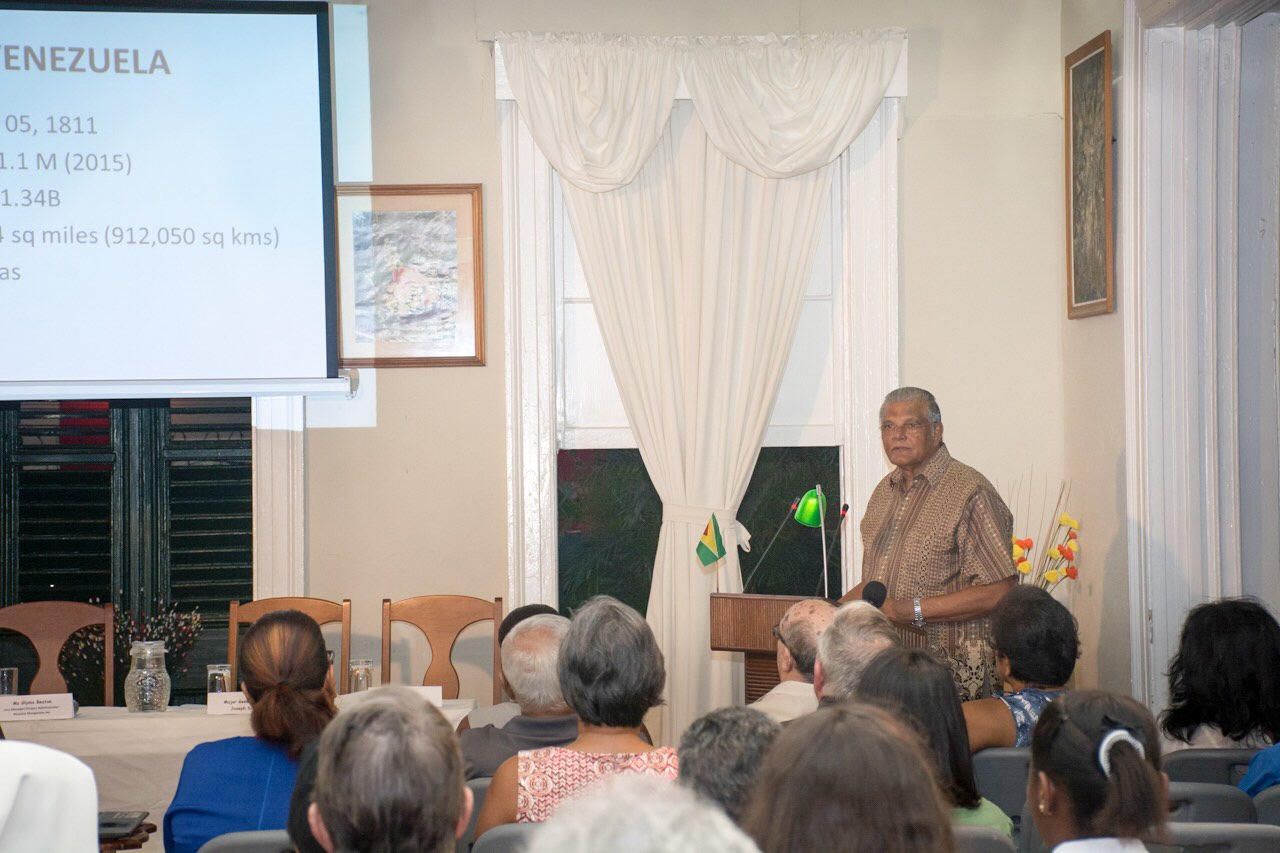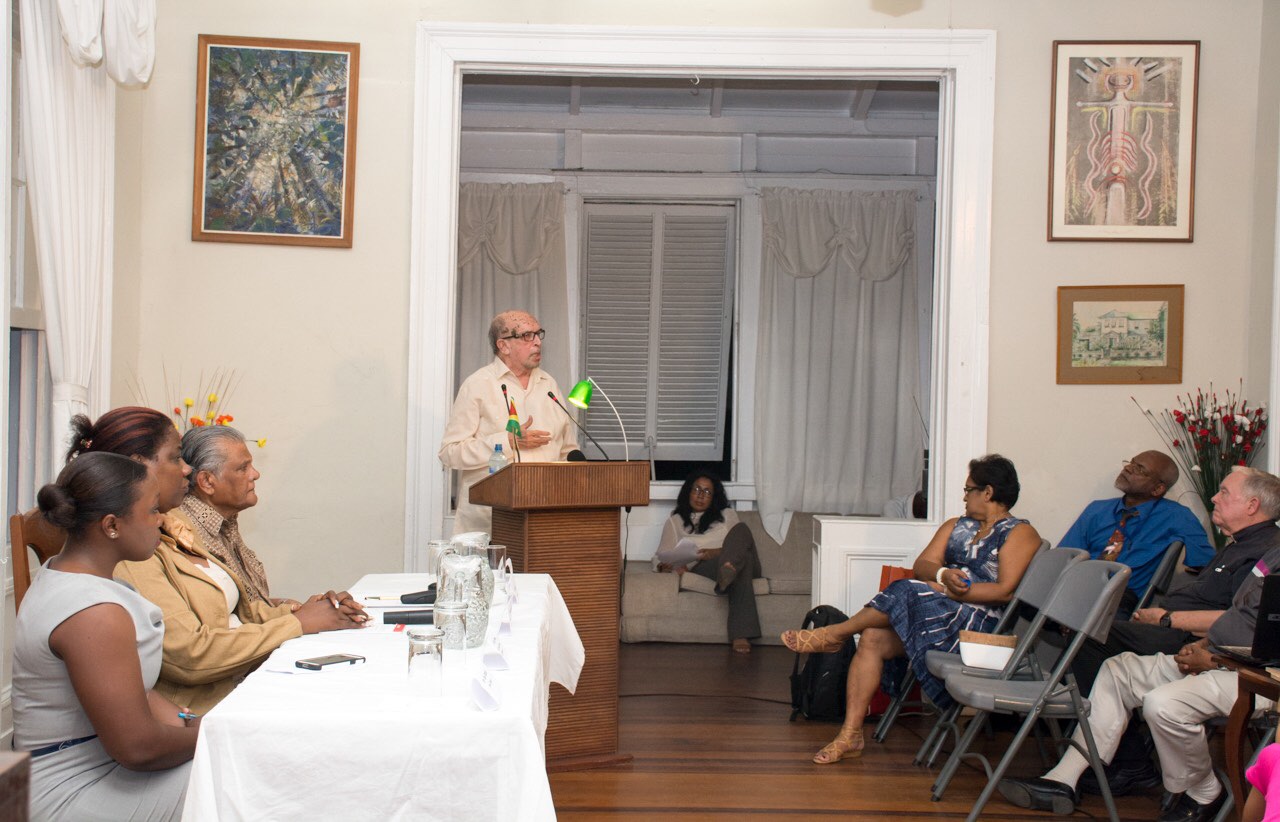Activity: Panel discussion
Host: Moray House Trust
Date: 18th October 2016

Many of us know that Venezuela has the largest fossil fuel reserves in the region. Few of us seem aware of the extent of economic and humanitarian crisis facing the country’s 30 million plus inhabitants, with profound shortages of food, power and medical supplies now commonplace. Moray House Trust is committed to promoting informed discussion and debate in Guyanese society. The Trust convened a panel to discuss the situation in Venezuela and how it may affect Guyana. Nadia Sagar, performing the functions of moderator, welcomed an audience in which the church and civil society were well represented.
“Hard Times in Venezuela” opened with a slide presentation by Major General (retd) Joseph G.Singh, Special Assistant to the current and the two previous Presidents. MG Singh’s career in uniform spanned 35 years. He was the Chief of Staff of the Guyana Defence Force from 1990 to 2000. He has travelled extensively across Guyana for many years and is familiar with its terrain and its settlements and is therefore well equipped to provide an overview of the situation.
MG (retd) Joe Singh spoke about the increasing polarisation within Venezuela, the militarisation of the society and the proliferation of irresponsible mining operations as the economy (and with it traditional jobs and sources of income) has unravelled. Credible analysts have placed inflation at 700% and it continues to rise. Consequently, over 70,000 Venezuelans have fled the cities and flocked to the mines in search of work and adequate pay.
A lengthy drought spanning several years has contributed to Venezuela’s problems and meant that it is unable maintain a steady flow of electricity (much of which is generated by hydropower). Photos in the slide presentation showed how some areas behind the Guri dam on the Caron River in Bolivar state (which has a hydroelectric capacity in excess of the 10,000 megawatts) have been reduced to desert by the drought. Water levels at the dam reached a historic low this year.
Joe Singh also traced the onset of serious food and health problems. He reminded the audience that in 1961 Venezuela was the first nation in the world to be certified by the World Health Organisation for eradicating malaria. By the end of 2016, there are expected to be over 200,000 cases of malaria in the country. Joe Singh also outlined a plan of action for Guyana to address some of the challenges this situation might pose. His recommendations included proposals to conduct smear tests of all those crossing the border and ensuring that adequate supplies of drugs, slides, microscopes and trained personnel are on hand in border settlements to deal with inflows.
The second speaker, Ms Glynis Beaton, is also familiar with our border settlements. Ms Beaton, the President of the Guyana Diabetic Association, presented a sobering picture of the potential stresses liable to affect health provision in outlying areas. She alerted the audience to the challenges faced by small communities near the border such as Baramita which have very limited resources and allocations for health provision. They are not equipped to deal with an influx of persons requiring medical attention or an outbreak of, for example, malaria or diphtheria.
Urica Primus, the President of the Guyana Women Miners’ Association, was the third speaker. She described her organisation as the ‘eyes and ears of the interior’ and spoke of its work to combat the extensive practice in mining regions of trafficking in persons and to seek justice for victims of this practice. Venezuelans, because of their current economic circumstances, are particularly vulnerable at present. Ms Primus pointed out that Guyana is just a boat ride from Venezuela and that persons are already crossing the border in search of food and medical supplies.
The final speaker, Mr. Rudolph Insanally, addressed the geo-political implications of the crisis and its possible impact on the longstanding border dispute between Venezuela and Guyana. Mr Insanally, a career diplomat, has served as Guyana’s Ambassador to Venezuela and participated in the work of the United Nations, the European Union, the Commonwealth, the Organization of American States, the Caribbean Community, the Rio Group, the Union of South American Countries and a number of other international bodies. He also served (from 2001 to 2008) as the Minister of Foreign Affairs. He spoke with considerable knowledge and authority about the fragility of the current situation and the range of possible outcomes. He made reference to the outgoing UN Secretary General’s pledge to deliver an assessment of the dispute before he leaves office in December. He also discussed the pros and cons of President Granger’s plea for the dispute to be referred to the International Court of Justice for a final settlement.

Members of the audience also contributed to a lively discussion after the panel’s presentations. One spoke of the large numbers of Guyanese who had moved across the border to live in Venezuela during hard times in Guyana. Several asked Mr Insanally to speak further about the border dispute and the role of the United States in the arbitration of the matter.
Video Clips
1: Selected Clips: Major General (ret’d) Joe Singh, Glynis Alonzo-Beaton, Urica Primus and former ambassador to Venezuela, Rudy Insanally share their concerns about the situation.You Tube Link: https://youtu.be/U6kwSeFLeCQ
2: The Humanitarian Crisis in Venezuela: clips from Joe Singh’s briefing.
You Tube Link: https://youtu.be/MT_id8BtJkk
3: Disease and health provision: Communicable disease specialist Glynis Alonzo-Beaton discusses the probable impact of refugees on Guyana’s small hinterland communities like Baramita.
You Tube Link: https://youtu.be/46sG11eY1Ds

